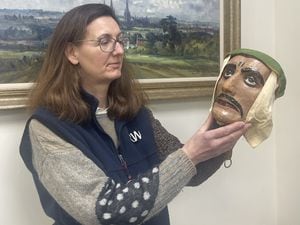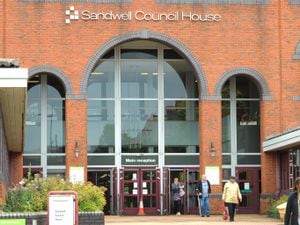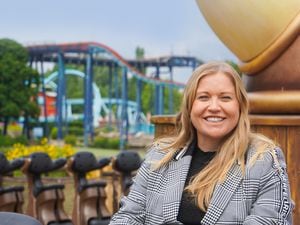What's it like to... Help fight cancer
Behind the scenes, doctors and scientists not prepared to let stand back and let cancer win.

Most of us have been touched in one way or another by cancer.
We might have battled this cruel disease ourselves, supported a loved one or grieved the loss of someone dear.
It has been estimated that one in two people born after 1960 will be diagnosed with some form of cancer during their lifetime.
It's a statistic that is both horrifying and terrifying. But behind the scenes there are doctors and scientists not prepared to let stand back and let cancer win.
They are fighting back.

By putting cancer cells under the microscopes in labs, they are finding new ways of exploiting their weaknesses and stopping them in their tracks.
At the same time they are providing a beacon of hope to the hundreds of thousands of people affected by the disease every year.
Among them is Dr Frank Mussai who is an honorary consultant in paediatric oncology at Birmingham Children's Hospital and a research fellow for Cancer Research UK.
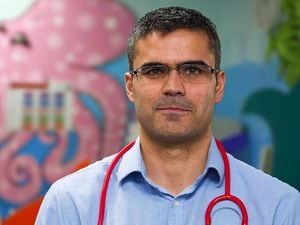
The 36-year-old works at one of the charity's funded laboratories, which is based at the University of Birmingham's Edgbaston campus, and also runs a weekly clinic at the hospital.
His team's research includes work to better understand and improve treatment for children with cancer.
In particular, it is investigating how cancers suppress the immune response to avoid destruction.
"We know that the immune system is normally a powerful defence for the body but some cancers are able to effectively switch off our immune system so that it no longer works.
"We work with patients to develop new drugs and new ways to stimulate the immune system to attack the cancer," explains Dr Mussai.
There are 12 members of the research team including fellow supervisor Dr Carmela De Santo and research assistant Sarah Booth, along with students, post-doctoral researchers and technicians. The group is also supported by the hospital's oncology research nurse team who help to discuss the research with patients and ensure samples are collected for analysis in the laboratory.
"Patients at the children's hospital, and their families, kindly donate samples of blood or tumour to our work. We are able to extract the cancer cells from these samples and then study them to get a better understanding of what's going on," says Dr Mussai.
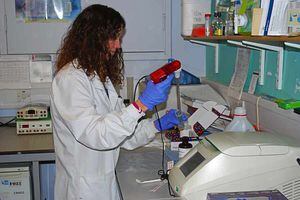
When the laboratory receives a sample of blood, they start by separating the cancer cells so they can be removed for examination
The sample is put in a test tube and then spun at high speed in a centrifuge, which causes the components to separate, enabling the cancer cells to be identified.
Research projects being carried out by the team include investigating how neuroblastoma – the most common solid cancer in childhood – prevents the immune system from working.
One study has been looking into ways of reactivating the immune system to target leukaemia after the discovery that some cancers are reliant one particular nutrient for survival.
Dr Mussai says: "We were the first group to show cancer is dependant on one nutrient. All cells use this nutrient but some cancer cells are dependant on it for their growth.
"Working with a clinician in Hong Kong, we found that without this nutrient, the cancer cells are starved and they die. This research is being used for clinical trials for new treatments."
Last year, Cancer Research UK spent more than £8 million on research in Birmingham with the funding coming entirely from voluntary donations.
Dr Mussai, who has been part of the research team since 2013, says every penny is put to good use. "The funding that we receive from Cancer Research UK is incredibly important to make the research that we do in the laboratory possible. It allows us to buy the chemicals and agents to study cancer cells from patients and to learn more about how they develop and how we treat them with new forms of treatment," he says.
The charity's research in the region includes the Cancer Research UK Clinical Trials Unit, which plays a leading role in co-ordinating clinical trials for both children and adults with cancer.
Within this unit, the national team co-ordinates children's cancer trials in 21 hospitals across the UK including Birmingham Children's Hospital.
Birmingham is also home to one of Cancer Research UK's Experimental Cancer Medicine Centres, which develops and tests the latest treatments in early stage clinical trials.
Dr Mussai says both the clinical and research sides of his job are very rewarding. "I love my job. It's a great privilege to be able to work with these children and their families and to be part of their treatment.
"It's known as bench-to-bedside medicine. The exciting part is what we do is in the laboratory because we go from taking a patient's sample to learning something new about it to using it to create a new therapy."
"What we do here can have direct benefits for children or older people with cancer."
By Heather Large
World Cancer Day 2017 takes place on February 4. Cancer Research UK is joining with nine other charities and calling on the nation to wear a Unity Band in one act of unity to beat cancer sooner. The Unity Bands are available in all Cancer Research UK stores and online at cruk.org/worldcancerday for a suggested donation of £2. A range of Unity Bands designed for children and can be found in M&Co stores across the UK for a suggested donation of £1. The charities are encourage people to share their photos using #ActofUnity.



